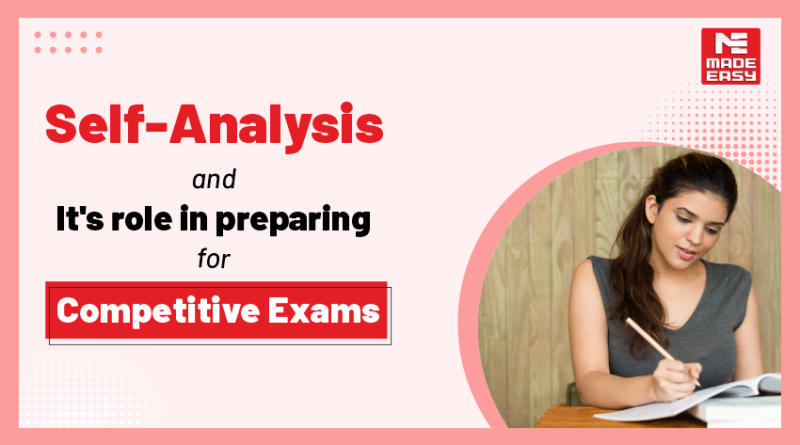Importance of Self Analysis
We all have our own set of strengths and weaknesses. But, how we act upon it is the most important thing. Firstly we need to analyze within our own selves if we are aware of the same. This is when Self-Analysis comes into the picture.
Self-Analysis allows aspirants to assess the level of preparation in order to improve performance in competitive exams. It also aids the student to sort through the available abundance of materials and streamline their preparation smartly.
These days everyone wants to be on top and due to peer pressure, comparison with fellow aspirants, constant distractions, and exposure to the vast plethora of available materials, aspirants seem to lose track. They seem to be asking the same questions over and over again.
“Why can’t I figure out the best strategy to prepare and crack this exam?”, “Why aren’t my scores in mock tests improving?”, “Why can’t I remember what I study?”, “No matter how much I study I see no improvement?” and many more questions.
Most of us are aware of the way to go about the basic preparations for the exams but tend to drift away from our plan. The most common and first thing that a student hears is ‘swallow the syllabus’ i.e. know the objective of the exam and what needs to be studied. But instead, they jump into the middle of the ocean without planning and lose their way.
Here’s how you can deal with the pressures of preparing and cracking competitive exams.
What is Self-Analysis?
The generic context of Self-Analysis is that it is a process of understanding oneself through self-assessment in order to explore one’s own character, feelings, motives, and desires. Self-Analysis meaning is closely associated with self-awareness. It is a holistic idea that can be applied to all aspects of our daily life not restricted to just examinations or careers.
Self-Analysis is an internal process and a do-it-yourself activity. You can use it to assess and improve your level of preparation for the exams you plan to ace. The foundation for analyzing oneself is an honest and unbiased assessment. To generate meaningful results, it is essential that we assess ourselves from the perspective of what efforts are required for clearing competitive exams, how to adapt to smart studying, assessing one’s core strengths, and identifying where one is lacking in exam preparation.
How can students use self-analysis as an effective tool?
- Self-Analysis helps the students to identify their strengths and weaknesses in various areas of preparation
- For example, time management, subjects, syllabus, study methods, reading previous year question papers, what works best for you, as one size fits all does not work.
- The analysis involves identifying progress toward targeted performance.
- For example, taking mock exams help quantify and assess the level of preparation.
- During the process of self-analysis, the candidates can identify the gap in the preparation required to clear the competitive exam.
- For instance, identify subjects that one is strong at or very weak, and channelize efforts towards the weaker sections thereby improving their performance.
- If self-evaluation shows poor preparation or failure to reach the mark of optimum preparation required for the competitive exams the candidate is preparing to appear, self-analysis helps better and makes necessary amends to study habits.
- Candidates can use self-analysis as a way to boost confidence and gain self-awareness as to where the student stands in the level of preparation, thereby giving an edge to the candidate.
- Self-analysis can be used to phase out unnecessary distractions out of the way while preparing for competitive exams.
- Students must also take into consideration the distractions that come by in their daily life
- For instance, social media, an abundance of materials available online and in the market, or trying to study in-depth even if sometimes it is not required, and so on.
- Helps candidates know the exam and its objective.
- Through this candidate has clarity as to what the exam conducting body is looking for and makes the student well-versed with the syllabus.
- Depending on the outcome of the self-analysis students can draft and follow a timetable.
- Make short-term and long-term plans
- Do not attempt to make over-ambitious timetables. Make realistic achievable targets.
- Work towards time-based targets and allot the right amount of time for the right subjects and topics.
- Always make time for revisions.
- Don’t forget to take breaks
Before we proceed with the details associated with self-analysis meaning, let us find out the must-know aspects linked with self-analysis for better performance in the actual competitive exams.
Which direction is best to study for competitive exams?
According to the science of architecture (Vaastu), the best direction to study for competitive exams is either the North or East direction. Experts recommend that exam aspirants preparing for competitive exams must find a room in the northeast direction to study for the respective target exam. The north direction indicates progress, whereas the east direction indicates prosperity and achievement. In addition, the sun rises in the east, thus making it the best direction to study for competitive exams.
How to crack competitive exams?
It is one of the most common queries of exam aspirants preparing for competitive exams after graduation. As a competitive exam aspirant, you must know that there is no particular exam strategy for all exam aspirants. Therefore, it is important to know the expert-faculty-recommended tips and tricks and prepare for the respective competitive exam accordingly. Here are the tips and tricks to help aspirants crack competitive exams after graduation or during college.
- Create a study timetable: If you aim to crack competitive exams with decent marks, you must create a proper study timetable and follow it properly. Before preparing this timetable, you must study the exam syllabus well. It will help you prepare a timetable that serves your purpose. In addition, it is crucial to understand that a study timetable must also comprise certain break segments. It helps exam aspirants reenergize themselves for exam preparation and prepare better for their respective exams.
- Choose the expert guidance on time: A right mentor or guide can help exam aspirant achieve their competitive exam goal in the best way. Therefore, it is crucial to enroll in a regular course such as MADE EASY regular courses and utilize the guidance of experts who are part of the respective course. It helps to boost confidence regarding their performance in practice tests and actual exams.
- Prepare notes: Exam aspirants must prepare the study notes rightly. One must prepare different sets of notes for each subject to ensure proper preparation during the entire exam tenure. In this way, exam aspirants can study each subject well and score well in the respective competitive exam. These days, e-notes are quite popular, but if you want to retain the subject concepts for a long, you can opt for creating hand-written notebook-based notes.
- Do regular revision: Most exam aspirants find it difficult to retain the subject material learned for a significant period. Therefore, faculties recommend that aspirants must perform quality revisions at regular intervals. If you are serious to crack the aimed competitive exams after graduation, you must prepare a regular revision schedule that caters to each subject in the competitive exam.
- Attempt mock tests and revision tests: Exam aspirants attempting regular mock or practice tests will find this study exercise beneficial to boost confidence during the examination preparation tenure.
- Believe in yourself: You must realize that self-belief and self-confidence can improve your exam scores significantly. Believe that you can achieve your goal and replace the external negative talks and discouragement with positive thoughts.
Thus, these are some expert tips that will help to crack competitive exams with the top scores. Follow these tips and tricks and see your scores improve with every practice test.
What is the importance of Self-Analysis?
- It provides us with a road map to crack the competitive exam and make the necessary changes or improvements.
- Self-analysis enables us to be mindful of our preparation and increase clarity toward the objective of the exam.
- Boost our confidence through self-improvement as the process makes the student familiar with all their strengths, abilities, shortcomings, defects, etc.
- A major obstacle to preparing and clearing the exam is the inability to know where one stands in the level of preparation. Self-evaluation clears the confusion and aid in choosing the method of study best suited for them.
- Helps reflect on and track progress.
How to boost confidence?
Every exam aspirant must have ample self-confidence, a critical factor that significantly determines the success rate of an exam aspirant. If you feel you need to boost your confidence for competitive exam preparation, the below-mentioned tips and tricks will help you to boost your confidence to an appreciable extent.
- Accept yourself with positivity: Most exam aspirants find it challenging to accept their present version. Therefore, it is important to understand that the first step to boosting confidence is self-acceptance. It offers the respective exam aspirant to understand the areas in which he/she needs to put in the required effort.
- Stop comparing yourself with others: Comparison is the killer of self-confidence. If you see your peers achieving certain goals and milestones, you must not envy and compare yourself with them. Instead, you must appreciate them and focus on your path. Always remember that every individual has his/her set of goals. Therefore, it is crucial to focus on your goals and put in the best efforts to achieve them.
- Count your achievements: Yes, you heard that right! You must always be proud of your achievements and understand the worth of each achievement. You must remind yourself of all that you have achieved to date. Another key benefit of counting your achievements is that you will stay on track to achieving the next milestone, thus helping to boost confidence.
- Begin with small steps: An exam aspirant must begin one step at a time and avoid hurrying up to gain self-confidence. Show up every day in front of the mirror and tell yourself your present version is good enough, and the steps you will take shortly will improve your overall personality. To get started, watch online videos or listen to podcasts that guide students and exam aspirants to boost confidence. In this way, you will feed positive thoughts into your mind that will eventually lead to an overall improvement in self-confidence.
- Measure your progress: Once you take the required measures to boost confidence, you will see significant improvements in your personal and professional lives. It is the critical point where you must track your progress and appreciate yourself. You can take a short break for some time from your studies and pamper yourself with your favorite activity or hobby.
These specific steps will help you achieve the required level of self-confidence in the best possible manner, thus positively influencing your performance in competitive exams.
When should you conduct Self-Analysis?
- While preparing for competitive exams
- Whenever your life needs a change
- After college graduation
- When deciding on a college degree
- Preparing for a job interview
- During job self-evaluations
- When applying for a promotion
- Before a career switch
- In various aspects of our daily life
Self-Analysis Techniques
SMART is an acronym that stands for specific, measurable, achievable, relevant, and time-based. This exercise will help in setting clearer goals for SWOT Analysis.
- Specific: What goals do you want to achieve, exactly?
- Measurable: How will you measure progress? What does success look like for you?
- Achievable: Can you actually achieve this goal?
- Relevant: Does this goal fit with your other goals and overall life plan?
- Time-based: How long will it take you to achieve this goal?
SWOT Analysis
SWOT is an acronym for Strengths, Weaknesses, Opportunities, and Threats. This exercise helps in self-introspection and in understanding yourself and preparing for growth. Before SWOT Analysis write down your goals using SMART Criteria.
- Strengths
- Strengths are internal positive attributes or capabilities a person has control over and can make full use of.
- What subjects you are good at?
- What makes you stand out like skills, certifications, education, achievements, or connections.
- What skills do you have better than anyone else?
- What personal resources can you access?
- What do other people like your boss or peers see as your strengths?
- What values and ethics set you apart from others?
- When are you most active and can study well?
- Weaknesses
- Weaknesses are negative aspects and attributes which you have little control over.
- What resources are not accessible to you?
- What tasks or subjects do you usually avoid due to a lack of confidence?
- What will the people around you see as your weaknesses?
- Level of confidence in your education and skills training?
- What personality traits hold you back (for example, are you disorganized, do you have short durations of attention or are you poor at handling exam stress)?
- Opportunities
- Opportunities are uncontrollable external events a person can potentially leverage.
- What new technology can help you? Tools to make study smarter.
- Can any of your strengths open up an opportunity?
- What trends do you see in exam patterns, and how can you take advantage of them?
- Is there an unfilled need around you?
- Do you have peers or mentors to help or guide you through the exam preparation?
- Threats
- Threats are uncontrollable external factors that might overcome or damage the strengths and opportunities.
- What obstacles do you currently face?
- What are your competitors or peers doing?
- How many aspirants are competing with you?
Benefits of Personal SWOT Analysis
- Provides a structure for self-analysis. Abstract introspection doesn’t help us improve and identify drawbacks.
- SWOT focuses on both positive and negative attributes.
- Focusing only on the good things won’t give a clear direction of what to improve or what needs to change.
- Focusing on your weaknesses and threats might get you overwhelmed and disheartened before you come up with an action plan.
- SWOT analysis focuses on internal characteristics and factors that affect your opportunities on which you have better control.
How to Utilize Personal SWOT Analysis Results?
- There are 2 ways to analyze the SWOT matrix – Match or Convert.
- Matching means connecting two categories to determine the course of action.
- For example, matching strength to opportunities shows you where to be aggressive and take action.
- Matching weaknesses to threats exposes the area you should work on or situations to avoid.
- To convert is to turn negatives into positives.
- Converting your weaknesses into strengths or threats into opportunities.
- Growing a skill set through education.
- Finding a creative way to feature a weakness as a strength.
Conclusion
Self-Analysis is not only a road-mapping tool but also a confidence booster to help you prepare for the examination and give your 100%. It provides you with a positive approach during the process of preparing to appear for competitive exams. Amidst the stress of preparing and cracking the exam, do not forget to take care of your body and mind.
All said failure is also a part of the growth process. Students should not be disheartened about a poor grade or failure; instead, they should analyze their mistakes in order to succeed. A failed exam does not imply a career failure. To achieve the goal, one can attempt and try again.
All the Best! We hope this article helps you in your preparation.
Keep Reading
Dear Aspirants,
Your preparation for GATE, ESE, PSUs, and AE/JE is now smarter than ever — thanks to the MADE EASY YouTube channel.
This is not just a channel, but a complete strategy for success, where you get toppers strategies, PYQ–GTQ discussions, current affairs updates, and important job-related information, all delivered by the country’s best teachers and industry experts.
If you also want to stay one step ahead in the race to success, subscribe to MADE EASY on YouTube and stay connected with us on social media.
MADE EASY — where preparation happens with confidence.

MADE EASY is a well-organized institute, complete in all aspects, and provides quality guidance for both written and personality tests. MADE EASY has produced top-ranked students in ESE, GATE, and various public sector exams. The publishing team regularly writes exam-related blogs based on conversations with the faculty, helping students prepare effectively for their exams.




